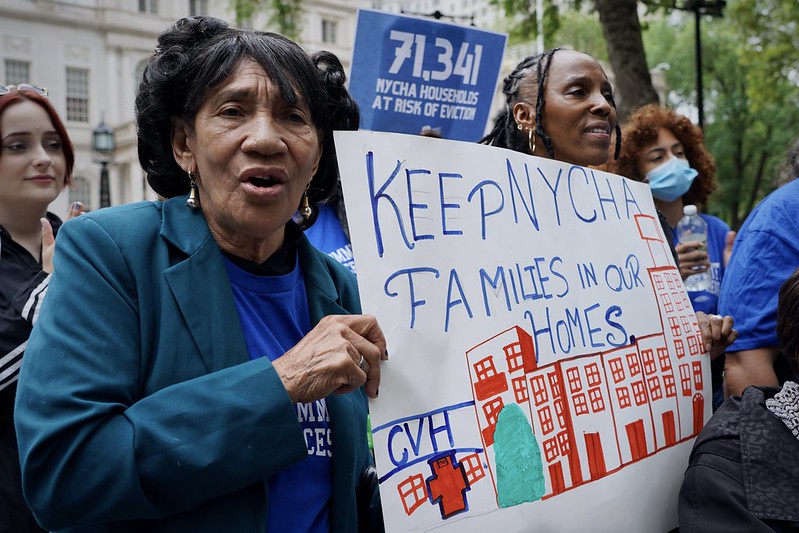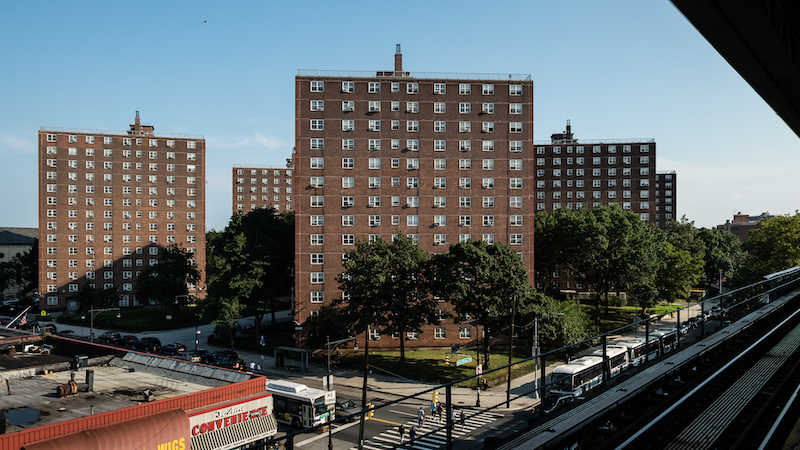At a recent City Council hearing, NYCHA shared that more than 70,000 households still owe rent, due in large part to being put at the back of the line for state pandemic rent relief.

Gerardo Romo / NYC Council Media Unit
NYCHA tenants and advocates rallied with council members in June 2023, asking the budget to include rent relief funding for NYCHA tenants.In 2021, when New York State rolled out its COVID-19 rent relief program, New York City Housing Authority (NYCHA) residents were not included in the initial wave of funding.
The impact of that still reverberates years later, with tens of thousands of public housing tenants behind on rent and the housing authority struggling to meet the cost of operational needs.
On Wednesday, the City Council’s Committee on Public Housing held a hearing focused on evictions and rent arrears in public housing, due to the lack of state dollars from the Emergency Rental Assistance Program (ERAP).
Opened in June 2021, ERAP provided up to 12 months of owed rent and three months of future rent to tenants and households financially impacted by the pandemic. Payments were made to landlords directly on their behalf.
NYCHA communities were among those hardest hit by COVID-19: in a survey conducted by the Community Service Society (a City Limits funder) in August 2020, more than a fifth of public housing respondents reported having a household member who’d been sick, while nearly half reported losing work or income.
A year after the ERAP application launched, more than 73,000 NYCHA tenants had back rent, with more than 31,000 applying for the state funding. However, public housing tenants only started getting rent relief money last year, after pushing the state to include more ERAP funds in its budget specifically for public housing and Section 8 residents.
“NYCHA’s ongoing federal disinvestment compounded by inadequate ERAP has deepened resident mistrust and uncertainty,” Travis Bostick, a director of policy and research at the Association for Neighborhood and Housing Development, testified at the hearing. “We want to emphasize that without urgent and substantial intervention, New York City faces a crisis of escalating homelessness and a continuous decline in the quality of NYCHA’s housing stock.”
NYCHA received an estimated $159 million worth of ERAP funding, which was $39 million more than what the housing authority anticipated, according to NYCHA’s Chief Operation Officer, Eva Trimble. So far, $148 million has been credited to residents’ accounts.
While NYCHA is still in the process of doling out the funds, back rent is still a major concern. As of Sept. 1, more than 70,000 households still have rental arrears, including 20,000 who are senior heads of households, according to Trimble.
The average amount of arrears per household is $6,915, spanning an average of 14 months, she shared, with about 20 percent of households owing more than $10,000. The average rent that NYCHA bills to tenants—where households typically pay no more than 30 percent of their income— is $651, but the average rent collected is $399.
The housing authority relies on rent payments for one-third of its operational budget to upkeep maintenance work. Currently, NYCHA also needs close to $80 billion worth of capital repairs in its portfolio over the next two decades.
“Unfortunately, we are currently collecting only about 68 percent of owed rent, and rent arrears now stand at $487 million—nearly four times what is was in 2018 and well beyond the ERAP funding we’ve secured for residents,” Trimble said.
The balance of rent arrears saw a steady increase since the start of the pandemic.
Annika Lescott-Martinez, NYCHA’s chief financial officer, testified that the balance in December 2019 was $125 million—an amount that includes back rent from 1935, when NYCHA was first built.
Along with ERAP funding, NYCHA is counting on rental assistance from the State COVID-19 Rental Assistance Program (CRA) and the federal HOME American Rescue Plan Program (HOME-ARP), which would provide as much as $35 million and $150 million, respectively, according to Lescott-Martinez.
“Even if we get the maximum amount from those programs, our rent arrears would still be $300 million,” she said.
State of evictions
NYCHA resumed rent eviction cases in January 2022, after a near two-year moratorium during COVID-19. Since then, there were two evictions in 2022, 58 in 2023 and 174 so far this year, as of Sept. 1. But Trimble emphasized throughout the hearing that keeping tenants in their home is a priority.
Concerns around the Permanent Affordability Commitment Together (PACT) program, which transfers traditional Section 9 public housing properties over to private management and to the more lucrative Section 8 program, were also raised.
Although the eviction rate is expected to “increase a little bit” over the next couple of years, according to NYCHA’s First Deputy General Counsel, Hannah Roth, the rate for both traditional Section 9 public housing developments and PACT sites are both lower than the citywide average.
Gillian Connell, NYCHA’s managing director of strategic operations for real estate development, added that the rate of eviction before the pandemic and present day is lower.
“So in 2019, NYCHA had 563 evictions, I believe, which was about a .3 percent eviction rate,” said Connell. “Now today, we have a .12 percent [rate].”

Adi Talwar
NYCHA's Gun Hill Houses in the Bronx.Alexandra MacDougall, a staff attorney at the Legal Aid Society, called the state putting public housing and Section 8 tenants at the back of the line for rent relief “devastating.”
“We hear from PACT tenants that were approved for ERAP that the funds are not credited to their accounts,” MacDougall said.
“They get their approval, they see that they’ve been approved and when they go to their PACT landlord, the PACT landlord doesn’t really know what’s going on, they can’t give them a clear answer,” she added. “And then there’s not really easy access to NYCHA on that subject so we know that the money is there, that’s not the issue, it’s just that it needs to be credited to them.”
Councilmember Chris Banks, who serves as the chair of the committee on public housing, resonated with MacDougall’s testimony, sharing that he had heard about similar experiences in his district. “That’s true,” said Banks. “I know a couple of tenants at Boulevard Houses who have gone through that.”
More than 37,000 NYCHA units have converted or are in the process of converting to PACT, where rent collection rates are significantly higher, with 92 percent of rent collected at PACT campuses in 2023 compared to 68 percent at traditional NYCHA properties.
Connell said PACT sites have seen “robust” outreach including door knocks and in-person meetings to connect tenants to resources like the one-shot deal, a one-time payment provided by the city’s Human Resources Administration (HRA) for tenants at risk of eviction.
Trimble added that these efforts mirror the same actions NYCHA is taking to help residents pay their rent on time. But by contrast, PACT sites have the opportunity to forgive rent, while NYCHA is restricted from doing so, according to Lescott-Martinez.
“We have seen as developments go through conversions, they [the PACT partner] might forgive 100 percent of the rent, they might forgive a partial amount of the arrears,” she said.
Towards the end of NYCHA’S testimony, Chair Banks asked about steps households with rent arrears can take in the meanwhile.
“Residents should come into our property management offices and meet with our housing assistants,” said Trimble, staffers who are “trained to connect them to resources.”
“To talk about their income, family composition and any of the needs they have as a family in order to make the match to the right resources in order to bring them back to a state of good standing with their lease,” she said, “meaning they are either paying rent on time on a regular basis or are in a payment plan to start paying back their arrears.”
To reach the reporter behind this story, contact Tatyana@citylimits.org. To reach the editor, contact Jeanmarie@citylimits.org
Want to republish this story? Find City Limits’ reprint policy here.








